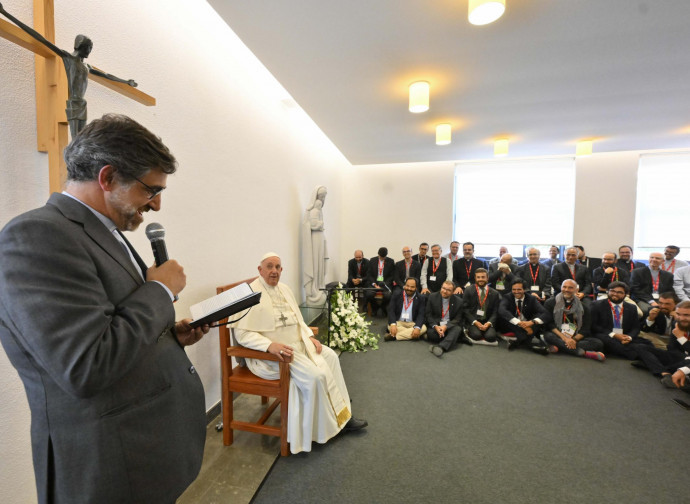The Pope's interviews guarantee fixed slogans and muddled minds
"Stuck in the past", clericalism, inclusion of homosexuals and transsexuals, the ever-present ambiguities in Pope Francis’ customary scripts were also staged in his meeting with the Portuguese Jesuits.

During his trip to Lisbon for World Youth Day, Francis included, as is customary, a meeting with his Jesuit confreres, also answering their questions. The text of this meeting was published by La Civiltà Cattolica.
There is always the hope that some important and clear teaching will come out of these meetings, despite the language used being rather informal, typical of a chat between friends. But, this is rarely the case for two main reasons. The first is that Francis persists with his own mindset and does not allow himself to be minimally challenged by the issues raised. That’s not to say his Jesuit confreres, being Jesuits, ask embarrassing questions, but the issues they do raise are always punctually addressed with the same thought patterns and abuse of the words he habitually uses: ‘indietrism’ (stuck in the past), clericalism and so on.
The second reason is that Francis makes generic judgments on very complex situations. Obviously, there is no time in a short meeting for eloquent speeches, but precisely for this reason a certain caution should be exercised. For example, in this case, the Pope expresses a very harsh and absolutely schematic judgement on the American clergy and Catholics, summarily accusing them of ideological ‘indietrism’: "there is a very strong, organised, reactionary attitude, which structures a belonging which is also affective. I want to remind these people that “indietrism” is useless”.
The impression is that in every meeting with his Jesuit confreres, but one could also say in every interview tout court, Francis' answers are standard, that they belong to a fixed conceptual and linguistic repertoire and that knows no real evolution. This time too, as in the past, Francis quotes Saint Vincent of Lérins on the development of dogma, but he only quotes half of his words, i.e. the words that indicate progress but never those that indicate perfect continuity, namely “by all, always, and everywhere”. Despite the fact that many experts have pointed this out to him, for example Fr Nicola Bux, he continues undaunted.
This approximation, which creates hasty and unjust judgements, also manifested itself in his dialogue with his Jesuit confreres in Portugal on a subject concerning the Social Doctrine of the Church. Responding to a question on the inclusion of homosexuals and transsexuals in the Church (to be expected!), Francis emphasised: "But what I don't like at all, in general, is that we examine the so-called “sins of the flesh” with a magnifying glass, as was done for so long with regard to carnal sins. If you exploited workers, if you lied or cheated, it didn't matter, and instead the sins below the waist were relevant”. .
This statement is lacking in many respects. First of all, it expresses a serious judgement in a few words and is the result of a personal impression on a very important and complex issue. It judges entire epochs of history, many priests in confessionals, educators, and parents by means of a cutting and unappealable judgement. Secondly, it is undoubtedly a wrong judgment because it does not take into account the great attention that the Social Doctrine of the Church, Catholic morality, and the manuals for confessors has assigned to so-called “social sins”.
The Catechism listed defrauding workers of their just wages as an action that cries out for vengeance before God. In Rerum Novarum Leo XIII placed at the centre of the Church's action those who were “alone and defenceless at the mercy of the greed of masters and of unbridled competition”. This judgement by Francis does not account for “that great movement for the defence of the human person”, mentioned in John Paul II's Centesimus Annus (No. 3), which strove for a more just society.
Certainly in the past, attention to sins of the flesh was much more intense than today, whereas today – so many confessors reveal – no one confesses any more acts against the sixth commandment: thou shalt not commit adultery. But there was certainly no lack of examinations of conscience for acts of social injustice and exploitation, no lack of acts of reparation for those sins, no lack of public interventions of charity as attested by the social saints and their charitable works. Indeed, Rerum Novarum ended with a hymn to charity. And how many generations of priests and laity did that encyclical inspire and guide?
After all, if today no one confesses sins of the flesh, perhaps everyone confesses sins against the commandment ‘Thou shall not steal’? This strange statement by Francis seems to forget that in the end there is only one virtue, and caring for the dignity of one's own and others' bodies also helps one to be respectful of labourers or the poor. The commandment against sins of the flesh is not something private, but has wide repercussions on social and political life, because from the cultivation of unbridled passions all the troubles of society are derived. In the Lisbon colloquium, Francis spoke a lot about the inclusion of homosexuals and transsexuals. But, we would not want him to have missed the connection between respect for the body and justice, between these two commandments.
